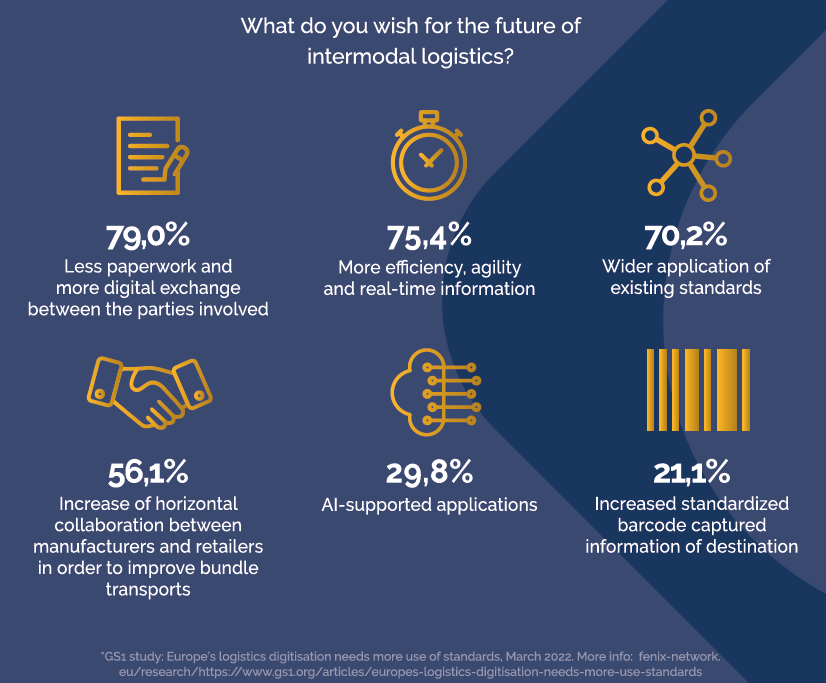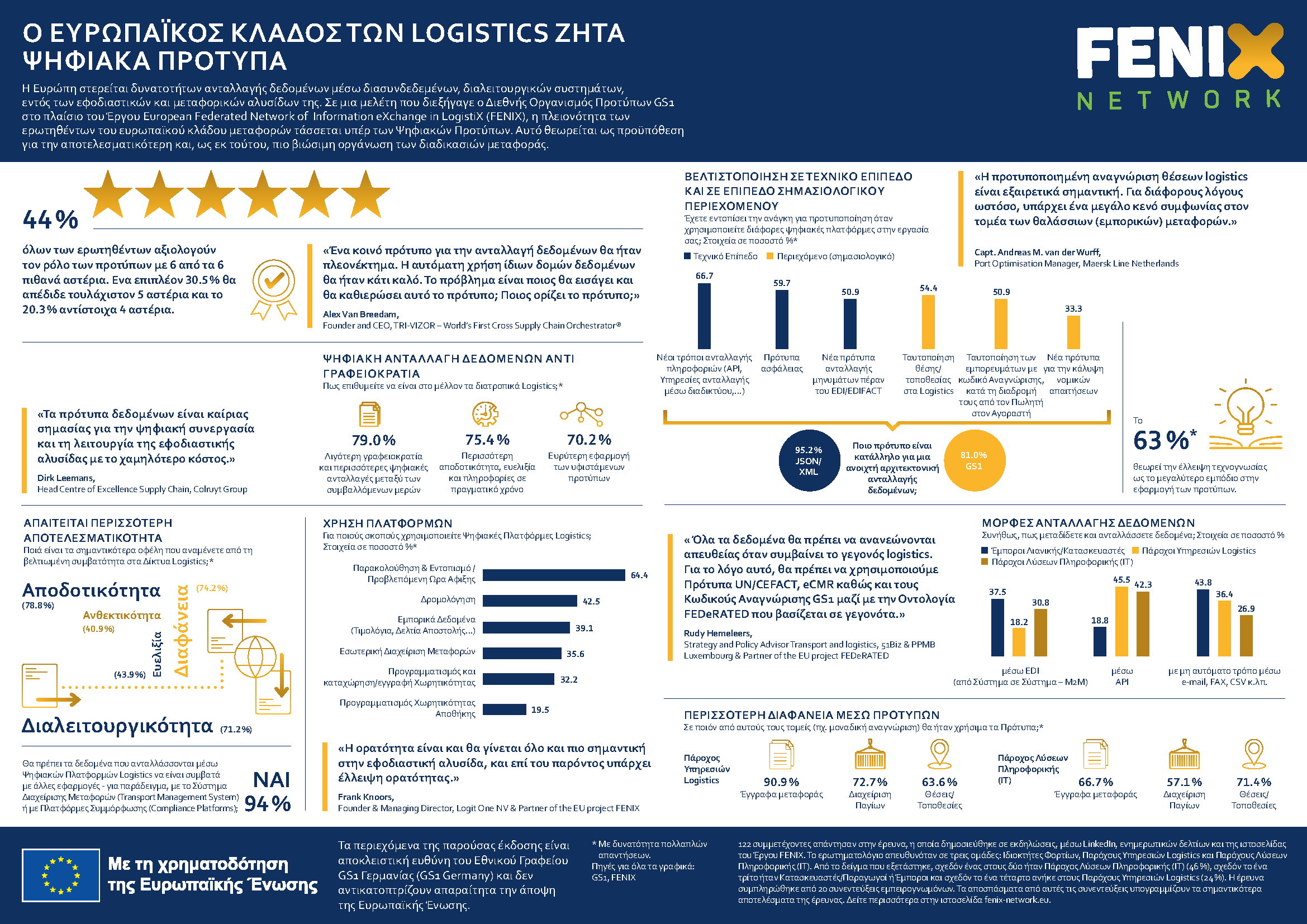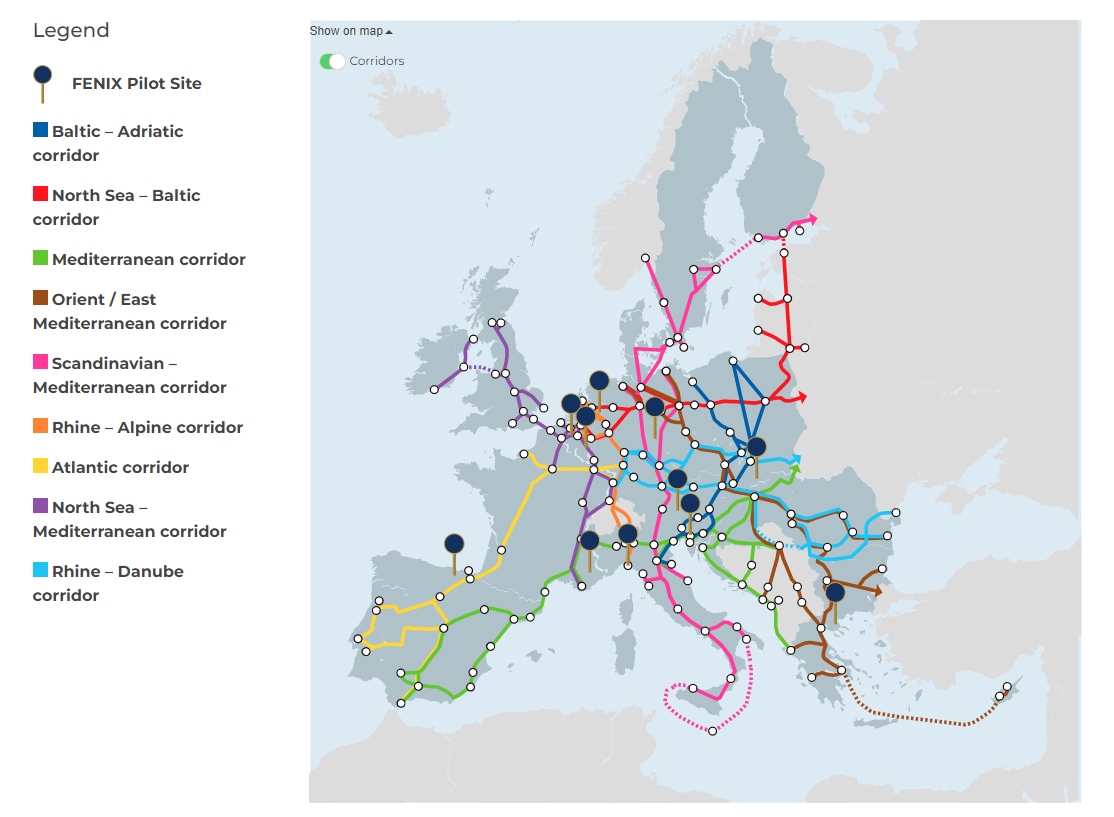FENIX
A European Federated Network of Information eXchange in LogistiX
About the Poject
The research project FENIX (European Federated Network of Information eXchange in LogistiX), also known as the European Federated Network of Information Exchange in Logistics, was funded by the Connecting Europe Facility program of the European Union.
Its purpose was to optimize processes in the transport and logistics sector through harmonized data exchange among the 9 core EU Transport Corridors.
The project follows the recommendation of the Digital Transport and Logistic Forum (DTLF) of the European Commission, which aims to provide all stakeholders in the transport and logistics industry with a sustainable and reliable federated network as a platform to enable the exchange of Business-to-Administration (B2A) and Business-to-Business (B2B) data.
Scope
- Interconnect various digital platforms and harmonize the services they offer. This would ensure seamless communication and data exchange between different systems.
- Ensure interoperability and establish common protocols to support shared data services. This would facilitate the exchange of information between different systems and enhance collaboration.
- Facilitate horizontal collaboration within the supply chain and operate as a technologically neutral open solution. By promoting collaboration among stakeholders regardless of their technological preferences, it fosters inclusivity and cooperation.
- Enable the sharing of data through digital information highway systems to serve the European logistics community. This involves developing systems that allow for the seamless sharing of data across borders, thereby supporting the needs of the European logistics community as a whole.
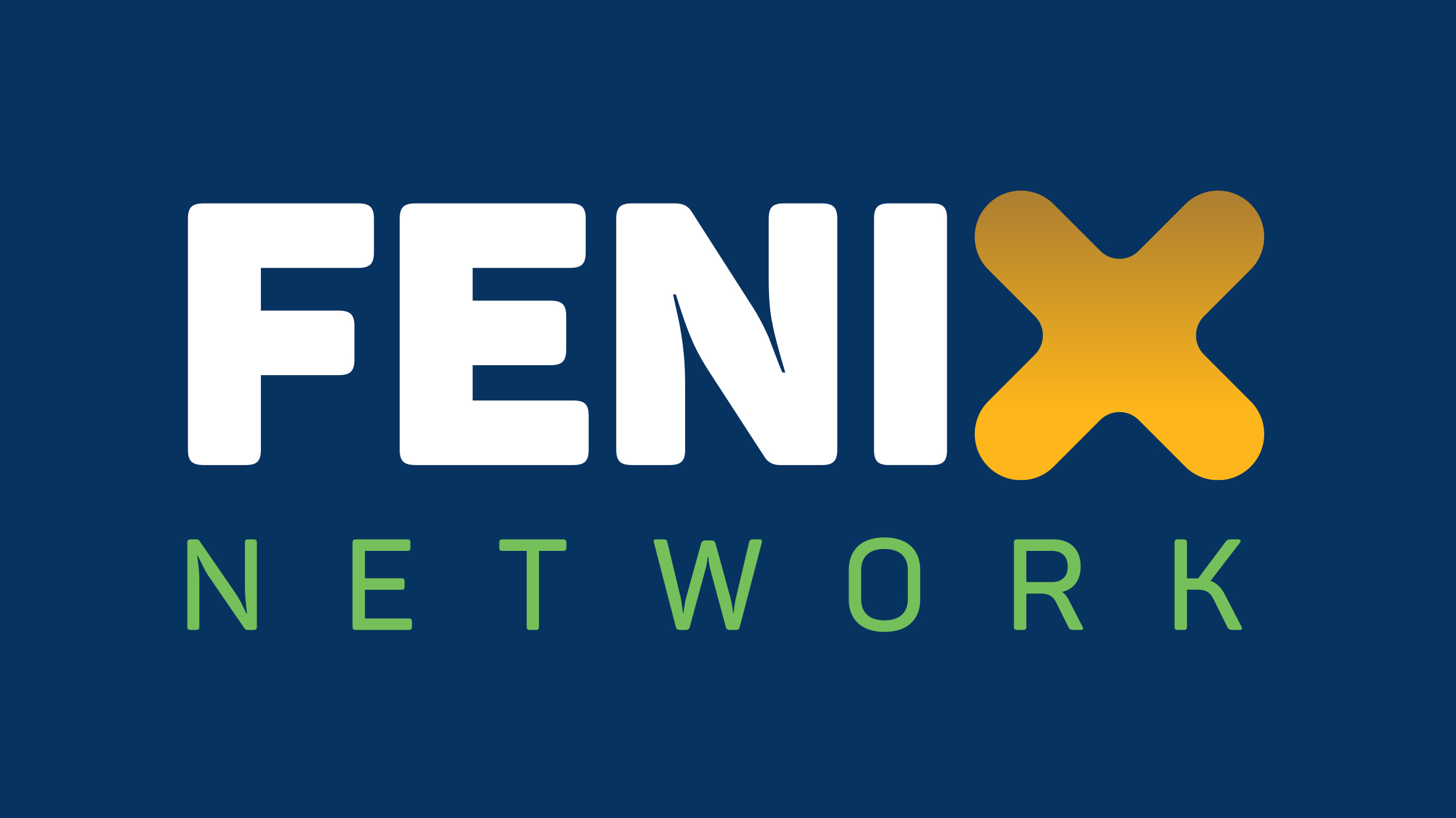
![]() Co-funded by the European Union's Connecting Europe Facility.
Co-funded by the European Union's Connecting Europe Facility.
The project's raison d'être
The lack of interoperable information exchange in the supply chains of the European transport network was a hindrance to the efficiency and sustainability of the logistics sector. Digital transport and logistics platforms in Europe were largely fragmented, making data exchange and coordination among them very difficult. The complexity of supply chains and their processes was time-consuming. Delays and empty freight containers, long waiting times at borders, as well as the lack of transparency in the transportation of hazardous goods, compounded a scenario where complex computer systems were unable to "speak the same language." The supply chains described in FENIX were already based on a wide range of existing standards; however, they lacked the ability for full harmonization among them, making their integration challenging.
GS1 Research: Need for increased use of standards for the digitization of the European supply chain.
The GS1, participating in the European FENIX project, investigated the gaps in standardization within the intermodal transport networks and digital supply chain platforms, as well as identified future opportunities. The foundation for these findings stemmed from an online survey conducted by the GS1 organization, supplemented by 20 in-depth interviews with industry experts in the supply chain sector.
This new international study aimed to determine how standards impact the logistics sector, especially when utilizing digital platforms that offer services such as Track and Trace, Estimated Time of Arrival (ETA) calculations, route planning, and commercial data exchange.
Here are the main conclusions of the research:
- 95% of participants evaluated the role of standards in ensuring interoperability with more than 4 out of 6 stars.
- 63% of participants stated that the main obstacle to implementing standards is a lack of knowledge.
- 94% of participants agreed that data exchanged via digital platforms should be interoperable.
- 81% of participants believe that international GS1 standards are suitable as a standardized architecture for open data exchange.
FENIX was mandated to craft an innovative landscape within the transportation and logistics domain!
FENIX, having secured funding amounting to €30,000,000 from the European Connecting Europe Facility (CEF) program, is dedicated to providing solutions aimed at optimizing cross-border communication within the realms of logistics and transportation.
The initiative spearheads the development of the inaugural Federal Data Exchange Architecture, catering to the European logistics community, comprising shippers, logistics service providers, transport infrastructure entities, municipalities, and governmental bodies. The primary objective is to ensure seamless interoperability among extant and emerging information technology systems integral to the supply chain.
Strategic project planning encompasses the creation of plug-and-play applications for enhanced route optimization and real-time dynamic rerouting, premised on live event monitoring. FENIX operates on a cloud-based framework, accessing reliable, real-time data streams pertaining to supply chain events. Crucially, this approach hinges upon the establishment of standardized protocols and a balanced blend of private and public governance.
Moreover, FENIX leverages technologies such as the Internet of Things (IoT), satellite navigation, and data analytics to foster the development of automated processes and intelligent algorithms, thus fostering efficiencies across expansive European supply chains.
The culmination of these efforts is the establishment of a cohesive European information exchange network, facilitating seamless integration and harmonization of diverse data systems, alongside the consolidation of logistics services.
The pivotal role of the GS1 Global System of Standards in the logistics operations digitalization.
Within this initiative, 7 National GS1 Offices have taken on the crucial responsibility for standardization and interoperability. Notably, GS1 Association-Greece, through its corresponding division, has actively participated in the FENIX consortium. This consortium stands at the forefront of the digitization of logistics operations, poised to bring about transformative changes across the logistics sector throughout the European Union!
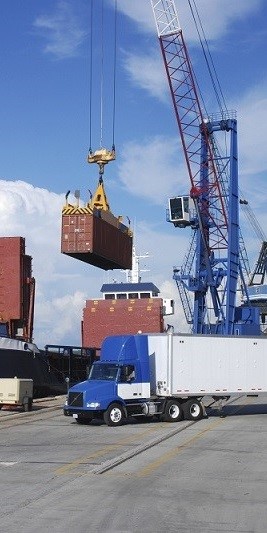
The GS1 Global Standards serve as the cornerstone of universal business communication, facilitating seamless interoperability among intricate systems and unlocking the transformative power of data into invaluable insights. Our digital innovation within the FENIX Project, leveraging cutting-edge technologies, stands poised to spearhead the much-needed overhaul in the European Union's transportation and logistics domain. This initiative heralds a new era of sustainable growth, meticulously tailored to meet the evolving needs of contemporary enterprises and the discerning expectations of end consumers.
Panagiotis Koronaios
CEO, SYNERGY in Supply Chain Α.Ε.
GS1 standards are playing an important role in the FENIX innovation to foster interoperability in the Mondelēz pilot site with the scope to interconnect seamlessly with other logistics and transport actors across Europe."
Zharko Vasilevski
Project Manager
Load Control Unit
Mondelēz
About FENIX2.0
The FENIX Network project consortium is now in full preparation for its continuation, FENIX 2.0, a collaborative initiative aimed at defining and maintaining FENIX standards to enable platforms to share data for cross-border harmonization and interoperability.
FENIX 2.0 is a non-profit organization that brings together companies, assisting them in adapting their IT platforms to facilitate data exchange in the form of digital information systems serving the European logistics community
